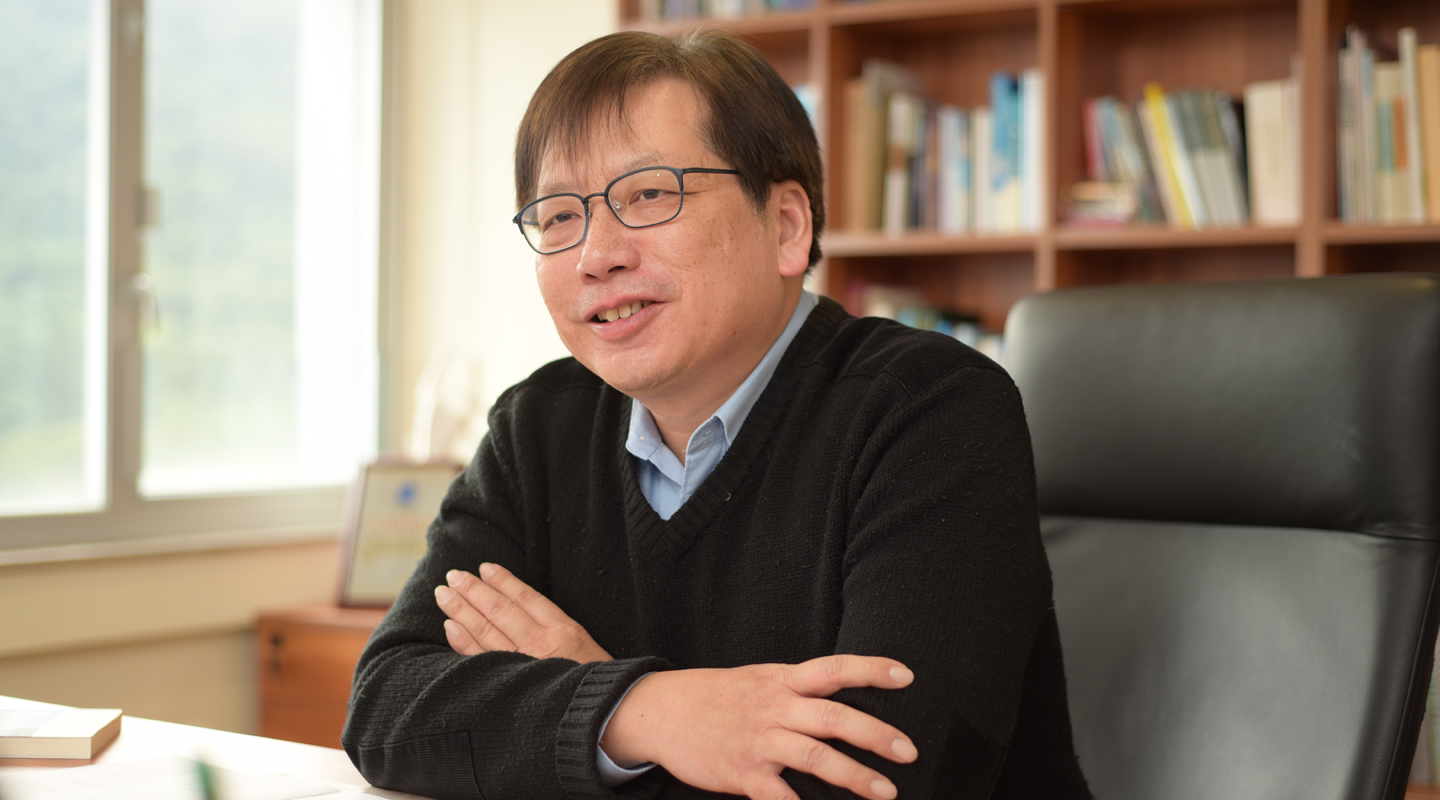Attaining Fluency through a Sunnier Path
Ho Che-wah Injects Literary Elements into Chinese Education

The CUHK campus, with its natural beauty and tranquility, gives free rein to one’s thoughts and imagination. Many writers who have spent time here either as teachers or students have captured its charm in words. With Prof. Ho Che-wah as its architect, the Chinese language course mandatory to all CUHK undergraduates has been inspiring undergraduates across disciplines to do the same.
The Chairman of the Department of Chinese Language and Literature had long noted the relative lack of literary elements in the Chinese language curriculum in Hong Kong. ‘It is heartbreaking to see young people showing little interest in the literature of their own language. Chinese is taught in the same way as that of a second language, which relies heavily on drills in listening, speaking, reading and writing. Students’ literary sense rarely gets developed and so they fail to appreciate the beauty of the Chinese language in terms of rhetoric, context and content.’
A New Lease of Life
To tie in with the reversion to the four-year normative curriculum in 2012, the Department of Chinese Language and Literature overhauled the mandatory course. Professor Ho saw it as an opportunity to put Chinese education back on the right track. ‘The newly-designed course highlights the literary elements in the hope of igniting students’ interest in the Chinese language and thereby promoting their language proficiency in Chinese.’
Credits of the two-semester course were doubled from three to six. In addition to providing training in practical writing and oral communication, it was designed to help students get a better grasp of Chinese culture via studying ancient and contemporary classics. At a conference where CUHK representatives introduced the new course design to its sister institutions, Professor Ho realized that CUHK is the only university in Hong Kong giving emphasis to literary elements in similar courses.

Tailor-made Teaching
In the form of small-class seminars of around 20 students, the course adopts a faculty-based teaching approach, encouraging students to read literary works related to their majors. For instance, law students can further their advocacy skills by studying an essay by Chen Zi’ang, a renowned Tang poet. ‘Even if they won’t use Chinese in the workplace in the future, we hope to motivate them to explore the literary world of Chinese and be enlightened by it,’ said Professor Ho.
Professor Ho attributed the success of the course to the support of the University. Some might doubt the usefulness of reading literature, but he believes it is the very key to enhancing language proficiency. ‘Good language skill is the prerequisite for any kind of job. It also facilitates communication with people from all walks of life.’
Painterly Essays
Articles inspired by the rocks and the streams of the CUHK campus were collated into a reference book for the use of the course-takers, from which a ‘literary trail’ was designed to deepen their understanding. The teachers would first analyse the articles with the students before taking them to the corresponding spots and guiding them to put their thoughts into words or pictures.
‘Literary CUHK’, a writing competition held by the Department, has been motivating students to write in the past years. Virginia Fung, winner of the silver prize and a Year 3 fine arts student, said her entry was inspired by her mother who was an alumna of CUHK. ‘When I was small she took me to New Asia College to collect pine cones. The fond memories mingled with my own campus life, which became fodder for my writing,’ she said.
Winners of the competition are not limited to students from the Faculty of Arts but also from various majors. Elton Hui, the merit awardee and a Year 2 medical student, said the course has reinforced his interest in language learning. ‘There is a misconception that Chinese equals colloquial Cantonese and requires no hard work to learn. But once we get the knack of literature appreciation, we will see the world in whole new perspectives.’

Writers Born from Writing
Writers must always keep a fresh eye on the world to be prepared for a visitation by the Muse. Deng Xiaoyi, a Year 2 anthropology student who came first in the competition, expressed in her entry the adaptation pains of a newcomer from the mainland. She wrote about sparrows territorializing different parts of campus. Ms. Dorothy Tse, one of the judges of the competition, commented that Xiaoyi’s work ‘implicitly expressed the author’s feeling as an outsider through the lens of an observer in a most unique, pungent, delicate and original way.’ ‘I was emotionally fragile back then and easily got affected by the surroundings. I don’t think I could write that again now,’ said Xiaoyi.
The course has benefitted Xiaoyi in more ways than one. Her wish to change from a science major to an arts major had always been held back due to her lack of self-confidence. ‘One day I ran across an article about one of the course teachers Prof. Hu Qi, and learnt that he originally set out wanting to be a scientist. His example prompted me to step out of my comfort zone.’
To evaluate the effectiveness of the course, students and teachers will meet every year to exchange views on improving the course. Some students found the course nourishing without the concomitant exam pressures. Professor Ho was pleased to find that the course has been raising students’ language awareness. ‘Young people should seize every chance to enrich themselves. Literature is a great trove not just of beautiful sentences but also of wisdom of life. When faced with adversity, one could always find comfort and inspiration from it.’
Winning entries of the writing competition can be viewed here.
This article was originally published in No. 513, Newsletter in Mar 2018.

